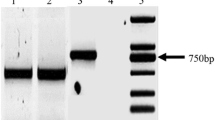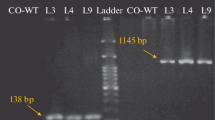Abstract
As a cell-wall relaxation protein, expansin plays an important role in plant stress-resistance processes. The Salix matsudana expansin gene EXPA23 in the salt-tolerant willow variety 9901 was highly expressed, being 1.83 times the level in the salt-sensitive willow variety Yanjiang, at fourth day after a 200 mM NaCl treatment, as determined by RT-PCR. The gene was cloned from 9901 and transformed into tobacco. In the salt-tolerance evaluation, the wild-type lines wilted severely after 4 days of a 200-mM salt stress, whereas the transgenic lines displayed better. And, the relative electrolyte leakage and malondialdehyde content of the transgenic lines were reduced by 9.87% and 19.26%, respectively, in comparison with those of the wild-type. Thus, SmEXPA23 over-expression greatly increased the salt tolerance of the plants. The results expand our knowledge of expansin’s role in plant resistance and provide some new insights into the salt-tolerance mechanisms of willow.
Key message
Over-expressing an expansin gene SmEXPA23 from the salt tolerant willow variety 9901 in tobacco plants showed enhanced salt tolerance that would extend our understanding of the salt tolerance mechanism and be an important gene resource for plant molecular breeding.








Similar content being viewed by others
Data availability
Sequence data that support the findings of this study have been deposited in the GenBank with the primary accession code BankIt2494722 EXP23 MZ934321.
References
Chen J, Xiong D, Wang W et al (2013) Nitric oxide mediates root K+/Na+ balance in a mangrove plant, kandelia obovata, by enhancing the expression of AKT1-type K+ channel and Na+/H+ antiporter under high salinity. PLoS ONE 8(8):e71543
Chen Y, Jiang Y, Chen Y et al (2020) Uncovering candidate genes responsive to salt stress in Salix matsudana (Koidz) by transcriptomic analysis. PLoS ONE 15(8):e0236129
Den X, Zhou S, Hu W et al (2013) Ectopic expression of wheat TaCIPK14, encoding a calcineurin B-like protein-interacting protein kinase, confers salinity and cold tolerance in tobacco. Physiol Plant 149(3):367–377
Feng X, Xu Y, Peng L et al (2019) TaEXPB7-B, a β-expansin gene involved in low-temperature stress and abscisic acid responses, promotes growth and cold resistance in Arabidopsis thaliana. J Plant Physiol 240:153004
Gaxiola RA, Rao R, Sherman A et al (1999) The Arabidopsis thaliana proton transporters, AtNhx1 and Avp1, can function in cation detoxification in yeast. Proc Nat Acad Sci USA 96(4):1480–1485
Geilfus CM, Ober D, Eichacker LA et al (2015) Down regulation of ZmEXPB6 is correlated with salt mediated growth reduction in leaves of Zea mays L. J Biol Chem 290(18):11235–11245
Han X, He X, Qiu W et al (2017) Pathogenesis-related protein PR10 from Salix matsudana Koidz exhibits resistance to salt stress in transgenic Arabidopsis thaliana. Environ Exp Bot 141:74–82
Han YY, Li AX, Li F, Zhao MR, Wang W (2012) Characterization of a wheat (Triticum aestivum L.) expansin gene, TaEXPB23, involved in the abiotic stress response and phytohormone regulation. Plant Physiology and Biochemistry 54:49–58
Hoagland DR, Arnon DI (1950) The water-culture method for growing plants without soil. Circular California Agricultural Experiment Station, Berkeley, pp 347–349
Hong Z, Lakkineni K, Zhang Z et al (2000) Removal of feedback inhibition of D1-pyrroline-5-carboxylate synthetase results in increased proline accumulation and protection of plants from osmotic stress. Plant Physiol 122(4):1129–1136
Jia H, Li J, Zhang J et al (2019) The Salix psammophila SpRLCK1 involved in drought and salt tolerance. Plant Physiol Biochem 144:222–233
Li F, Xing S, Guo Q et al (2011) Drought tolerance through over-expression of the expansin gene TaEXPB23 in transgenic tobacco. J Plant Physiol 168(9):960–966
Li J, Wang S, Yu J et al (2013) A modified CTAB protocol for plant DNA extraction. Chin Bull Bot 48(1):72–78
Liang W, Cui W, Ma X et al (2014) Function of wheat Ta-UnP gene in enhancing salt tolerance in transgenic Arabidopsis and rice. Biochem Biophys Res Commun 450(1):794–801
Liang W, Ma X, Wan P et al (2017) Plant salt-tolerance mechanism: a review. Biochem Biophys Res Commun 495(1):286–291
Liu HB, Li HY, Zhang H et al (2016) The expansin gene PttEXPA8 from poplar (Populus tomentosa) confers heat resistance in transgenic tobacco. Plant Cell Tissue Organ Cult 126(2):353–359
Lu P, Kang M, Jiang X et al (2013) RhEXPA4, a rose expansin gene, modulates leaf growth and confers drought and salt tolerance to Arabidopsis. Planta 237:1547–1559
Ma X, Cui W, Liang W et al (2015) Wheat TaSP gene improves salt tolerance in transgenic Arabidopsis thaliana. Plant Physiol Biochem 97:187–195
McQueen-Mason S, Cosgrove DJ (1994) Disruption of hydrogen bonding between plant cell wall polymers by proteins that induce wall extension. Proc Nat Acad Sci USA 91(14):6574–6578
McQueen-Mason S, Cosgrove DJ (1995) Expansin mode of action on cell walls: analysis of wall hydrolysis, stress relaxation, and binding. Plant Physiol 107(1):87–100
Munns R, Tester M (2008) Mechanisms of salinity tolerance. Annu Rev Plant Biol 59:651–681
Ren YQ, Chen YH, An J et al (2018) Wheat expansin gene, TaEXPA2, is involved in conferring plant tolerance to Cd toxicity. Plant Sci 270:245–256
Wang M, Xin Z, Zhen X et al (2016) A wheat superoxide dismutase gene TaSOD2, enhances salt resistance through modulating redox homeostasis by promoting NADPH oxidase activity. Plant Mol Biol 91(1–2):115–130
Yan H, Li Q, Park SC et al (2016) Overexpression of CuZnSOD and APX enhance salt stress tolerance in sweet potato. Plant Physiol Biochem 109:20–27
Yang R, Yin P, Liu X et al (2021) Expansin gene family in association with the genome differentiation of Salix matsudana. J Beijing for Univ 43(1):37–48
Zhu JK (2003) Regulation of ion homeostasis under salt stress. Curr Opin Plant Biol 6(5):441–445
Zhu G, Teng Y, Wang Y (2000) Contribution of prolines to protein thermostability. Prog Biotechnol 20(4):48–51
Funding
The research was granted by National Natural Science Foundation of China (Grant No. 31870648).
Author information
Authors and Affiliations
Contributions
All authors contributed to the study conception and design. RY and LY performed material preparation and research; XW, and YW, JZ participated in the physiological index tests; RY and JX wrote the paper. All authors read and approved the final manuscript.
Corresponding author
Ethics declarations
Conflict of interest
The authors declare that they have no conflict of interest or competing interests.
Ethical approval
This article does not contain any research involving humans and/or animals.
Additional information
Communicated by Klaus Eimert.
Publisher's Note
Springer Nature remains neutral with regard to jurisdictional claims in published maps and institutional affiliations.
Rights and permissions
Springer Nature or its licensor (e.g. a society or other partner) holds exclusive rights to this article under a publishing agreement with the author(s) or other rightsholder(s); author self-archiving of the accepted manuscript version of this article is solely governed by the terms of such publishing agreement and applicable law.
About this article
Cite this article
Yang, R., Yang, L., Wang, X. et al. Over-expression of the Salix matsudana expansin gene SmEXPA23 enhances plant salt tolerance. Plant Cell Tiss Organ Cult 152, 309–316 (2023). https://doi.org/10.1007/s11240-022-02407-0
Received:
Accepted:
Published:
Issue Date:
DOI: https://doi.org/10.1007/s11240-022-02407-0




